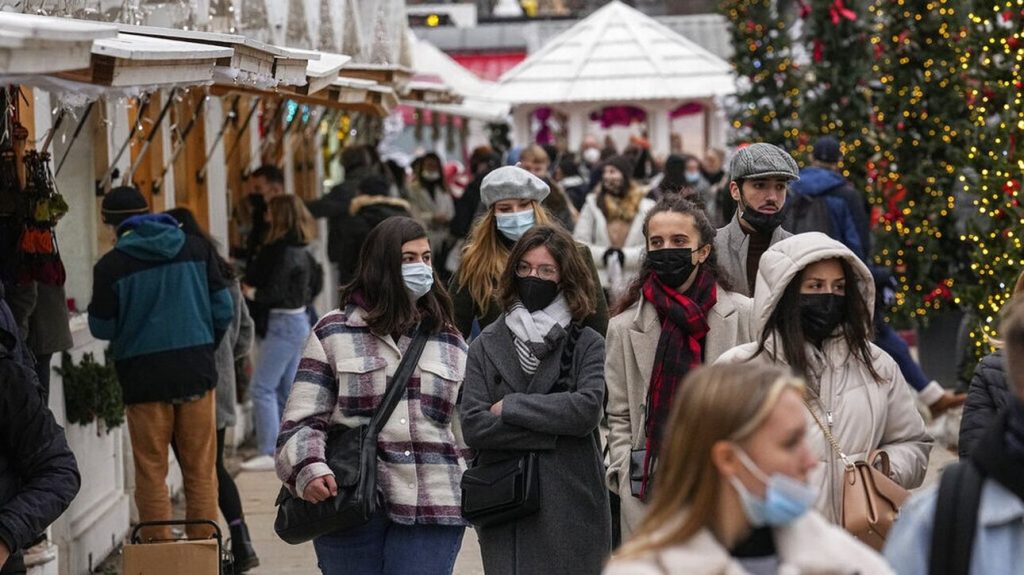Scientists are moderately optimistic that the Omicron mutation may be an indication that the coronavirus is gradually losing its "power" despite its extremely high transmissibility.
A breath from 2022 and the planet remains in a pandemic with the new variant Ομικρον into a frenetic course domination internationally, societies in psychological fatigue after two whole years of "state of emergency", and governments and scientists on constant alert.
Restrictive measures moderate or severely degraded, while already burdened Health systems are threatened not only by a possible influx of patients with the new coronavirus strain, but also by staff shortages that are estimated to lead to infection and forced isolation .

Within a few weeks of its appearance on the African continent, Omicron is "galloping"; it has already dominated Delta in several European countries, as well as in the United States, and the arrival of the new year is expected to find it Greece and Cyprus with forecasts talking about up to 12.000 cases of coronavirus in Greece and up to 3.000 cases in Cyprus after the New Year.
The outlook looks bleak, but the "light" may be hidden in cautious optimism scientists that the Omicron variant may be an indication that the coronavirus it gradually loses its "power" -despite the high number of infections that "accompany" the new strain.
The emerging picture of a milder disease, however, hides it as well "Trap" of complacency, and there may be the biggest threat, experts come at the same time to warn.
With the United Kingdom to be the first European country where Omicron prevailed, breaking one day in a row the records of more than 100.000 daily cases, the British newspaper "Guardian" captures current data and estimates of experts in search of the answer whether the Omicron mutation can signal beginning of the countdown to the end of the pandemic.
Referring to the record cases, the reinstatement of measures, the cancellation of Christmas events, as well as the anxiety that is expressed that the British NHS may be overwhelmed by large numbers of seriously ill, the British newspaper points out that the fear has been born that social constraints threat of a lockdown can become the new "normality".
Pandemic last year and this year
"It's a disappointing prospect. But is it realistic? Are we justified in drawing close parallels between this New Year and last year? " says the Guardian, noting that these are key questions, as trying to answer them, we can also find clues to the possible course of the pandemic as a whole.
At first glance, the two years look similar, with case numbers skyrocketing in just a few weeks in the UK. However, the hospitalizations and deaths from Covid-19 remain very low so far this year, with the latest research suggesting that the new variant appears to be causing fewer cases of severe disease compared to the previous ones.
Scientists welcome the latest studies as "good news", however at the same time draw attention. In Britain in particular, the daily outbreaks are "skyrocketing" - reaching 122.000 infections on Christmas Eve - and an estimated 1,7 million people in the UK were infected with the coronavirus last week.
The age factor
On the issue of age in relation to Omicron, most new cases, the Guardian points out, have occurred in young adults, which has led many experts to warn that if the new variant begins to affect older and more vulnerable people, hospitalizations could be increased.
On the other hand, a very large percentage of people - especially the elderly - have now been vaccinated against the coronavirus and especially with the booster dose will have acquired significant protection against the new mutation.
It remains to be seen how these different factors affect the figures. At this stage, the data are still being collected; it is too early to draw any definite conclusions, and in the meantime, political decisions need to be made to protect public health.
This is exactly what the infectious disease professor emphasizes Mark Woolhaus of the University of Edinburgh. "There is clearly a gap between infection and hospitalization. In the meantime, however, political decisions must be made. " said last week in the review Nature.
Will the virus stop causing serious illness?
To this question, many scientists believe that current evidence suggests that this hypothesis may be valid. Recent studies in Scotland, England and South Africa all point in this direction.
"My intuition is that this variant is the first step in a process by which the virus adapts to the human population to produce more mild symptoms." says Dr. Julian Tang, Professor of Pulmonology at the University of Leicester.
"In a sense, it is to the benefit of the virus if it affects people in a way that does not make them seriously ill because that way they can circulate and spread the virus even more." points out.
It will end up Covid-19 to "behave" like the flu?
Some health officials have predicted that Covid-19 could end up being "Behaves" like seasonal flu, which requires a new vaccine to protect against new strains appearing each year.
However, the professor Martin Heibert, of the London School of Hygiene and Tropical Medicine, argues that coronaviruses - like those that already cause colds - do not behave in this way:
"They do not appear as new executives every year. The reason we get sick in the winter is because our immunity to coronaviruses does not last long. And this virus seems to be more like those that cause the common cold. In other words, we may still need to consider getting vaccines to protect against it Covid-19 every year, because immunity will always slip. "
This does not mean that we are facing a "catastrophe" for the next five years, adds Julian Tang. "I believe that the virus will soon evolve away from the pandemic strain and become milder, more contagious to the point where we may only need to think about vaccinating the most vulnerable groups in the population."
Thanos Dimopoulos about Omicron and the course of the pandemic
The professor of Therapy-Oncology-Hematology, and rector of EKPA, also mentioned the Omicron variant and the way of its transmission. Thanos Dimopoulos, noting that the transmission of the new strain is much faster, however the data show that the disease is milder in fully vaccinated.
According to Mr. Dimopoulos, recent data from South Africa showed de-escalation of cases, while studies from Hong Kong, showed that this strain has a higher tendency to enter the cells of the upper respiratory tract and less to the cells of the lungs.
As Mr. Dimopoulos explained, speaking to SKAI, this means that the Omicron mutation causes what the common cold and not so much pneumonia. Also, the symptoms of Omicron infection are almost identical to those of the common cold.
He also said that in the coming days we will see an increase in cases. Hospitals, however, are not proportional to the number of cases and are shorter in duration, so we are dealing with a milder virus.
About when the end of the pandemic will come, Mr. Dimopoulos said:
"If Omicron prevails worldwide and vaccination coverage rises in countries with low rates, the pandemic will slowly go away and we will move on to an endemic manageable disease such as the flu."
David Ho: "Omicron can bring an end to the pandemic"
The famous epidemiologist David Ho reported that the Omicron mutation could bring an end to the pandemic more quickly.
Due to the high transmission rate of Omicron, the so-called "natural immunity" could bring an end to the pandemic and turn it into an endemic disease, at least according to world-renowned virologist David Ho.
"As all public health people have said, it can affect the entire population of a country like the United States."says Dr. David Ho, a professor at Columbia University. "Sometimes a rapid fire could burn very quickly, but then go out."
Ho led a study by scientists at the University of Hong Kong that looked at whether antibodies from 54 fully inoculated Pfizer / BioNTech, Moderna, AstraZeneca and Johnson & Johnson could kill Homicron in the laboratory. The 15 had also taken a booster dose.
Laboratory (non-clinical) research, some of which had been preceded by pre-publications, shows that those who had previously been ill with Covid-19 and those who have been fully vaccinated - even those who have had a third dose - are at risk of being infected with Omicron. At the same time, the new variant appears to be completely or largely resistant to all monoclonal antibodies used clinically today.
As he said, "It is no exaggeration to think that the SARS-CoV-2 coronavirus is now only one or two mutations away from being completely resistant to current antibodies, either the monoclonal ones used as treatments, or the antibodies generated by the vaccine or from infection with previous variants ”.
Source: CNN / AthensVoice.gr
